In recent years, the importance of renewable energy sources has become increasingly clear. As we work to reduce our reliance on fossil fuels and address the challenges posed by climate change, many people are turning to alternative sources of power, such as generators and solar panels.
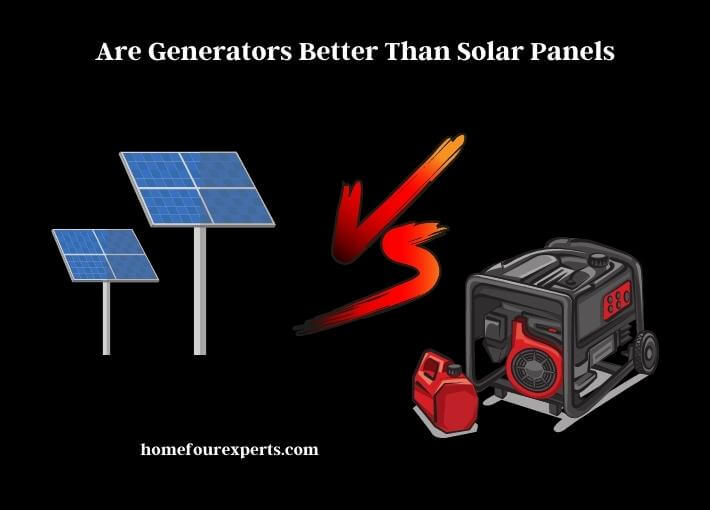
Both generators and solar panels have their advantages and disadvantages, and the choice between the two will ultimately depend on your specific needs and circumstances. Generators are typically more powerful and reliable, providing a steady supply of energy regardless of weather conditions or other factors. They can be expensive to operate and maintain, and they produce emissions and noise that can be harmful to the environment and your health.
On the other hand, solar panels are a more sustainable and environmentally friendly option, harnessing the power of the sun to generate clean energy without any emissions or noise. While they have a lower power output compared to generators, they can save you money on your electricity bill over time, and they may be eligible for tax incentives or other financial incentives.
Understanding Generators
Generators are devices that convert mechanical energy into electrical energy. They work by using a rotating shaft to turn a magnet inside a coil of wire, which then creates an electrical current. This current can be used to power a variety of devices and appliances, from household electronics to construction equipment.
Generators can be powered by a variety of fuels, including gasoline, diesel, propane, and natural gas. They come in a range of sizes and power outputs, from small portable units that can power a few appliances during a power outage, to large industrial generators that can provide backup power for entire buildings or neighborhoods.
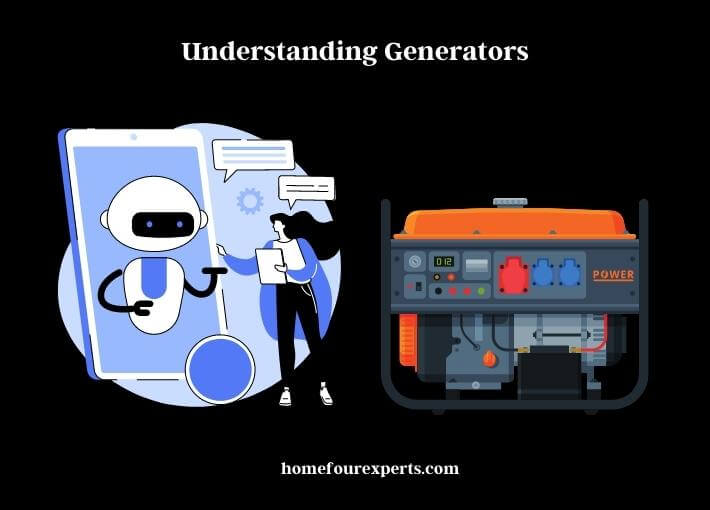
One of the main advantages of generators is their reliability and consistency. They can provide a steady supply of power regardless of the weather or other external factors, making them a popular choice for emergency backup power. Generators can be easily refueled and are typically more powerful than solar panels, making them a good option for larger power needs.
Generators also have some drawbacks. They can be expensive to operate and maintain, particularly if you need to run them for long periods of time. They also produce emissions and noise pollution, which can be harmful to the environment and your health. They require a fuel source, which can be a challenge in emergency situations or in remote locations.
Understanding Solar Panels
Solar panels are devices that harness the power of the sun to generate electricity. They work by converting sunlight into direct current (DC) electricity through the use of photovoltaic cells, which are made of semiconductor materials like silicon but they can also be susceptible to damage from various sources. This DC electricity is then converted into alternating current (AC) electricity using an inverter, which can be used to power a variety of devices and appliances.
Solar panels come in a variety of sizes and power outputs, from small panels that can power a single appliance to large systems that can provide electricity for entire homes or buildings. They can be installed on rooftops, on the ground, or even on vehicles like RVs or boats.
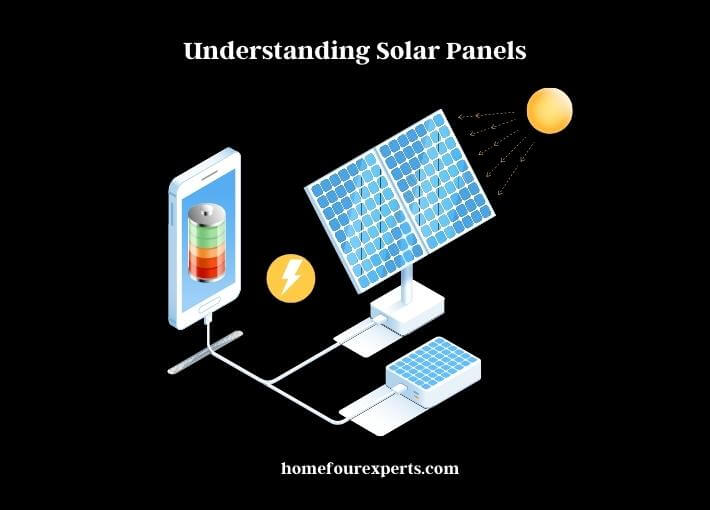
One of the main advantages of solar panels is their sustainability and environmental friendliness. They produce no emissions or noise pollution, and they use a renewable energy source that is readily available and free of charge. Solar panels can save you money on your electricity bills over time, and they may be eligible for tax incentives or other financial incentives.
Solar panels also have some drawbacks. They have a lower power output compared to generators, and their effectiveness can be affected by factors like weather and shading. Solar panels can be expensive to install, and they require regular maintenance to ensure they are functioning properly.
Factors to Consider When Choosing Between Generators and Solar Panels
When choosing between generators and solar panels, there are a number of factors that you should consider to ensure that you make the right decision for your specific needs and circumstances.
Power Needs
The first and most important factor to consider is your power needs. How much electricity do you need to generate, and for how long? If you have high energy demands or need to run appliances or equipment that require a lot of power, a generator may be a better choice. On the other hand, if your energy needs are relatively low and you are willing to invest in a larger solar panel system, solar panels may be a better option.
Cost
Another important factor to consider is cost. Generators can be expensive to purchase and operate, particularly if you need to run them for extended periods of time. Solar panels can also be expensive to install, but they can save you money on your electricity bills over time. You will need to consider your budget and calculate the total cost of ownership over the lifetime of the system.
Sustainability
If sustainability is a priority for you, then solar panels may be the better choice. They produce no emissions or noise pollution, and they use a renewable energy source. Generators, on the other hand, produce emissions and noise pollution and require a fuel source that may not be readily available or sustainable.
Reliability
Another important factor to consider is reliability. Generators are typically more reliable than solar panels, as they can provide a steady supply of power regardless of the weather or other external factors. Solar panels, on the other hand, can be affected by weather conditions like cloud cover or shading, and may not be able to provide consistent power in all situations.
Maintenance
Both generators and solar panels require regular maintenance to ensure that they are functioning properly. The type and frequency of maintenance required will vary depending on the system you choose. Generators may require more frequent maintenance and fueling, while solar panels may require occasional cleaning and inspection to ensure that they are generating power efficiently.
Power Output of Both Generators and Solar panels
The first factor to consider is the power output of both generators and solar panels.
Generators
Generators come in different sizes and capacities, but they generally have a higher power output than solar panels. For example, a 10kW generator can produce 10kW of electricity continuously, while a 10kW solar panel system will only produce 10kW under ideal conditions. Generators also provide a steady supply of power, which is essential for high-power appliances.
Solar Panels
Solar panels, on the other hand, have a lower power output compared to generators. They rely on sunlight to generate electricity, and their output can fluctuate depending on various factors, such as weather conditions and the angle of the sun. They are a more sustainable and environmentally friendly option, as they don’t produce any emissions or noise.
Cost Comparison of Both Generators and Solar panels
The cost of generators and solar panels is another crucial factor to consider.
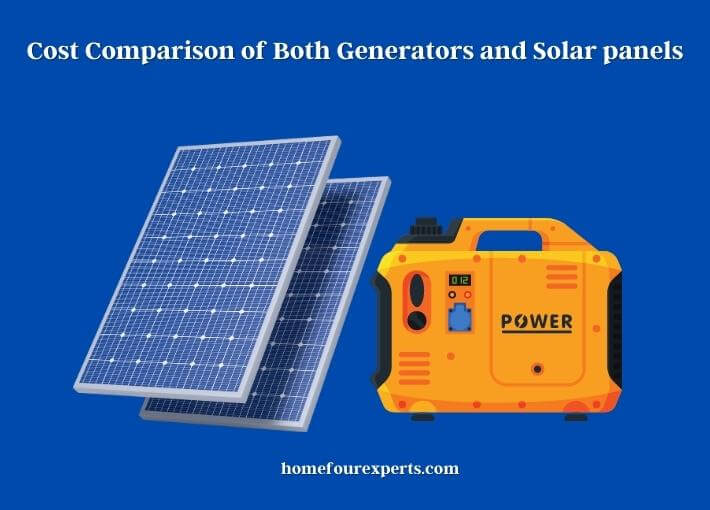
Generators
Generators can be expensive to purchase, especially if you need a high-capacity unit. The cost of fuel or propane to operate the generator can also add up quickly, especially if you use it frequently. Generators require regular maintenance, which can be costly in the long run.
Solar Panels
Solar panels can also be expensive to install, but their operating cost is relatively low. Once you’ve installed the panels, you won’t have to pay for fuel or maintenance. In fact, solar panels can save you money on your electricity bill over time, as you can sell excess power back to the grid.
Reliability of Both Generators and Solar panels
The reliability of generators and solar panels is crucial, especially if you live in an area with frequent power outages.
Generators
Generators are highly reliable and can provide power during an outage, regardless of the weather conditions. They require regular maintenance to ensure they’re in good working condition when you need them the most.
Solar Panels
Solar panels are less reliable during a power outage, as they require sunlight to generate electricity. You can install a battery backup system to store excess energy and use it during an outage.
Environmental Impact
The environmental impact of generators and solar panels is an essential factor to consider, especially if you want to reduce your carbon footprint.
Generators
Generators produce emissions and noise, which can be harmful to the environment and your health. The cost of fuel to operate the generator can be a significant contributor to your carbon footprint.
Solar Panels
Solar panels produce clean energy without any emissions or noise, making them a more environmentally friendly option. They also help reduce your reliance on fossil fuels and contribute to a cleaner environment.
Advancements and Trends in Generators and Solar Panels
Both generators and solar panels have seen significant advancements and trends in recent years as technology has improved and demand for sustainable energy solutions has grown. Some of the key advancements and trends in generators and solar panels include:
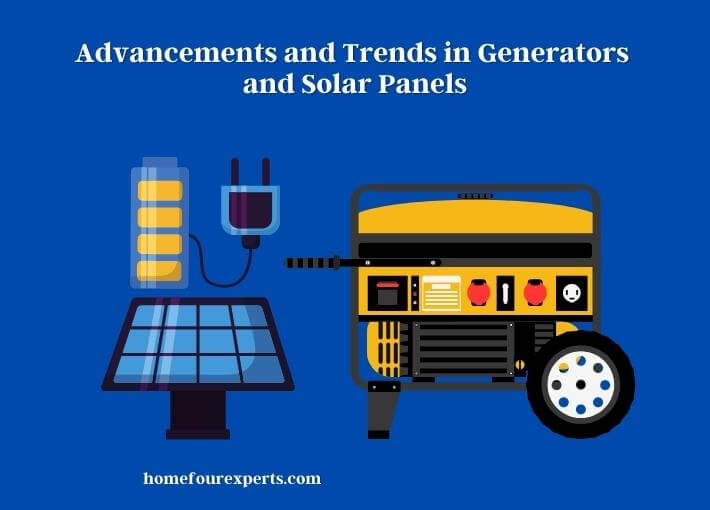
Generators
- Portable and Lightweight: Advances in generator technology have made it possible to create smaller, more portable generators that are easy to transport and use in a variety of settings. This has made generators more accessible and convenient for a wider range of people and applications.
- Fuel Efficiency: Modern generators are designed to be more fuel-efficient than older models, which helps to reduce operating costs and minimize environmental impact. Some generators now use advanced fuel injection systems and electronic controls to optimize fuel consumption and reduce emissions.
- Smart Features: Many new generators come equipped with smart features like Wi-Fi connectivity and remote monitoring, which allow users to monitor and control their generators from their smartphone or another device. This makes it easier to track usage, monitor maintenance needs, and ensure that the generator is running smoothly.
Solar Panels
- Higher Efficiency: Advances in solar panel technology have led to higher levels of efficiency, which means that modern panels can generate more power from the same amount of sunlight. This has made solar panels a more viable option for larger energy needs and has helped to reduce the cost per watt of electricity generated.
- Energy Storage: One of the biggest trends in solar panel technology is the integration of energy storage solutions like batteries. This allows users to store excess energy generated by their solar panels and use it later, which helps to ensure a steady supply of power even during periods of low sunlight.
- Integrated Design: Many new solar panels are designed to be more aesthetically pleasing and integrated with the architecture of the building they are installed on. This has helped to make solar panels more attractive to homeowners and businesses who may have previously been put off by their appearance.
Which Is Better: Generators or Solar Panels?
The question of whether generators or solar panels are better depends on a number of factors, including your energy needs, budget, location, and environmental concerns. Here are some pros and cons of each option to help you make an informed decision:
Generators
Pros:
- Reliable Power: Generators can provide a steady and reliable source of power, even during extended power outages or in areas with limited access to grid power.
- Quick and Easy Setup: Generators can be set up and ready to use in a matter of minutes, which makes them a convenient option for emergency situations or temporary power needs.
- Wide Range of Applications: Generators can be used for a variety of applications, from powering small appliances to running large construction equipment.
Cons:
- Environmental Impact: Generators can be noisy and emit exhaust fumes, which can be harmful to the environment and potentially hazardous to human health.
- Operating Costs: Generators require fuel to operate, which can be expensive and result in ongoing operating costs.
- Maintenance Requirements: Generators require regular maintenance and upkeep to ensure that they are running safely and efficiently.
Solar Panels
Pros:
- Sustainable Energy: Solar panels use renewable energy from the sun to generate power, which is a clean and sustainable energy source.
- Lower Operating Costs: Once installed, solar panels have no ongoing fuel costs and require minimal maintenance, which can result in lower operating costs over time.
- Long Lifespan: Solar panels have a long lifespan and can provide reliable power for up to 25-30 years or more.
Cons:
- Initial Cost: Solar panels can be expensive to install, and the upfront costs may be prohibitive for some homeowners or businesses.
- Weather-Dependent: Solar panels rely on sunlight to generate power, which means that they may not be able to generate enough power on cloudy or rainy days.
- Space Requirements: Solar panels require a significant amount of space to install, which may not be feasible for some properties.
In a Nutshell
The decision between generators and solar panels ultimately depends on your unique situation and preferences. While generators provide reliable power and are convenient for emergency situations, they can also be costly to operate and maintain and can have a negative impact on the environment. On the other hand, solar panels offer a sustainable and renewable energy source that can help reduce your carbon footprint and lower your energy bills over time, but the initial cost of installation can be high, and they may not be suitable for all properties.
When deciding between these two options, it’s important to consider factors such as your energy needs, budget, location, and environmental concerns. You may also want to consult with a professional to help you assess your options and choose the best solution for your specific situation.
Ultimately, both generators and solar panels have their advantages and disadvantages, and it’s up to you to decide which option is best for you. Whichever you choose, the goal is to have a reliable source of energy that meets your needs while also minimizing your impact on the environment.
About This Writer

Hi, I am responsible for the 'Homeowners Power Solutions' category. My name is Liam Jaxon and a licensed technician with 7 years of experience in vehicle batteries, electrical gadgets, and home appliances. My working experience in different residential & light commercial electrical sectors and the automobile industry helped to acquire vast knowledge in this industry.